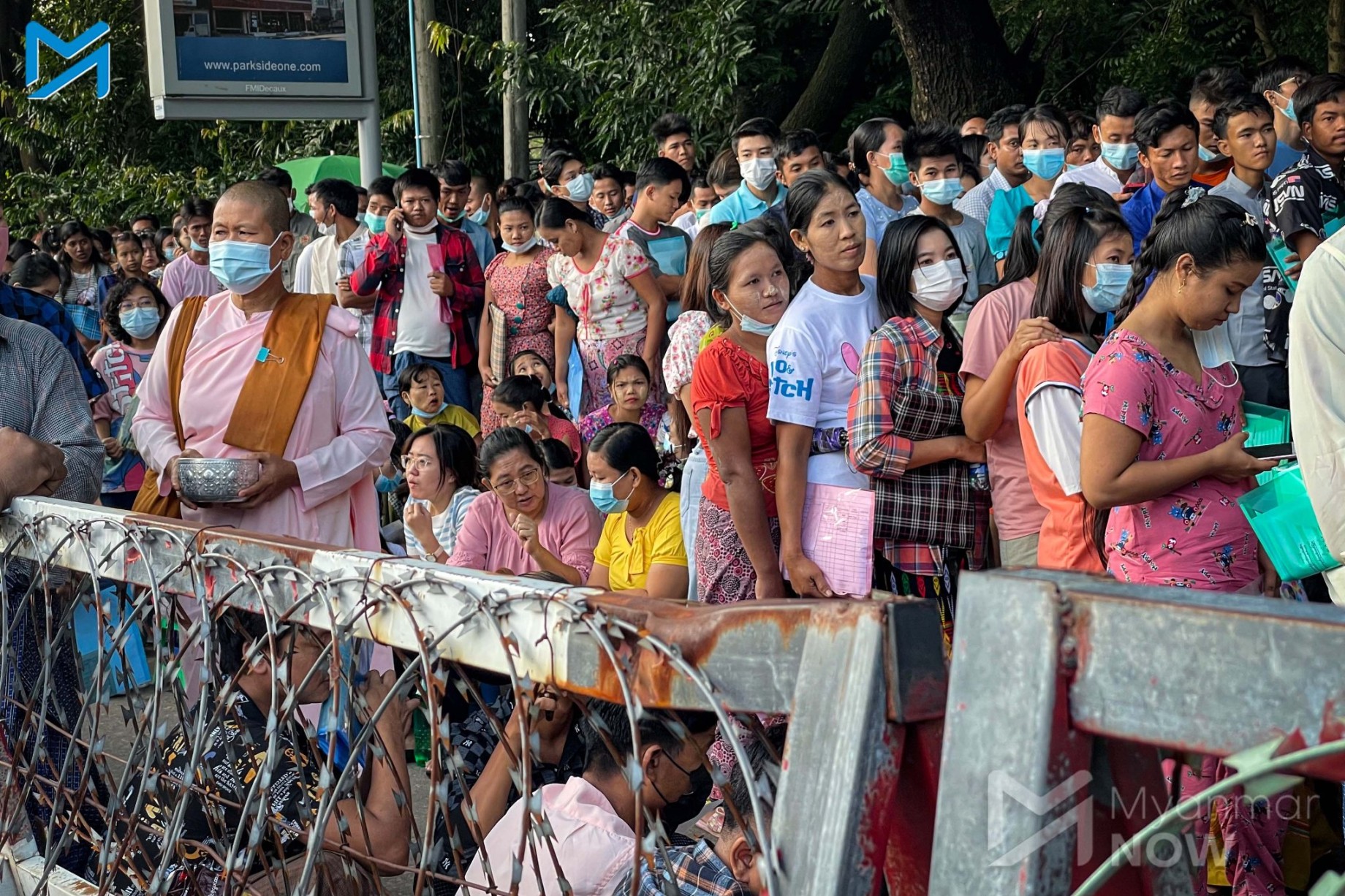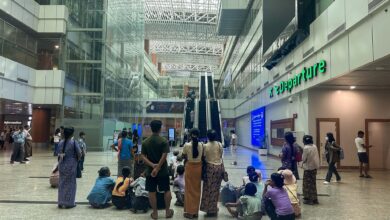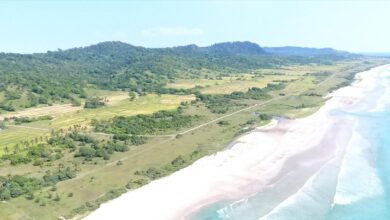
It was 4am when Chan Myae arrived at the passport office on the No. 1 Industrial Road in Yangon’s Yankin Township on the morning of January 2. Despite the early hour, he was far from alone—there were already at least 200 others standing in line ahead of him. And the queue just kept growing, soon more than doubling in length, even as it was becoming less and less likely that latecomers would have any luck putting in their applications that day.
For the 33-year-old Yangon resident, acquiring a new passport was a matter of some urgency. He had earned a qualification to work aboard a ship as a cook, but would not be able to find a job unless he was also able to travel outside of Myanmar. And so, amid the bustle of the swelling crowd, he waited anxiously for the office to open its doors at 9am.
But half an hour before that moment came, two police officials arrived to tell everyone that the office wouldn’t be opening that day, or any day in the foreseeable future.
“They just said that the office was closed. When we asked them why, they said they didn’t know. All they knew was that it would be closed for an indefinite period,” said Chan Myae. The sudden closure affected both those hoping to submit their applications and those who had already done so, he added.

It’s no secret that many people, especially the young, have sought to leave the country since the February 2021 coup. The internal turmoil and international isolation that ensued in the wake of the military takeover have devastated the economy. Desperate to find jobs elsewhere, thousands have flocked to passport offices to escape the stagnation—and the danger—that they face at home.
“Food prices are on the rise and the economy is failing. Some businesses have shut down completely. Work here just doesn’t pay enough to cover expenses. Some also feel unsafe, so there are many who want to go abroad,” said Ko Nan, a 30-year-old resident of Yangon’s Thaketa Township whose goal is to go to South Korea.
Thanks to corrupt officials and opportunistic brokers, however, the cost of acquiring a new passport soared after the coup. And as time went by, it became clear that even paying bribes and brokers’ fees did not guarantee success.
“Some people were denied passports even after paying huge sums of money. And then, as people were trying to find a way to navigate these obstacles, the passport offices were suddenly shut down. No one can explain why,” said Ko Nan, adding that his own attempt to get a passport began in the middle of last year.

‘Everything is in their control’
Passports in Myanmar are issued by the Ministry of Home Affairs, one of three ministries (in addition to defence and border affairs) under the direct control of the military. Until 2014, the only place to apply for one was in Yangon; but since then, 17 passport offices have been opened around the country.
Valid for five years, Myanmar passports are issued in several different types. The most common are PV for “visitors”—tourists and others planning short stays in foreign countries; PJ for Myanmar citizens seeking jobs abroad; and PS for seamen. Since the coup, holders of PJ passports have also been required to present another document—the Overseas Workers Identification Card, or OWIC—if they wish to work outside of Myanmar.
This is a matter of life and death for some people. For example, what about those who need to leave the country for medical reasons? Who will take responsibility if they die?
Another change introduced since the military takeover is a requirement to book an appointment online before showing up at the passport office. This is done using a QR code on the official website. However, that system was suspended in December of last year, ostensibly so that it could be upgraded.

Now that the passport offices have also been closed, thousands of would-be passport holders find themselves stranded. Even those who had already been notified that their newly issued passports were ready to be picked up are at a loss, as all operations have been put on hold.
Speculation is rife about why this has happened, but so far, few answers have been forthcoming. Meanwhile, many are watching the situation closely, hoping for news of a resumption of services.
“I’ve heard rumours that they ran out of materials to print the passports, but I don’t know for sure. In the meantime, we are always listening to the news. I’ve joined an online group for passport-related matters, and I’m always checking to see if the offices have reopened,” said a resident of Ayeyarwady Region’s Mawgyun Township who did not want to be named.
“Everything is in their control now,” he added, referring to the military. “They will reopen the passport office when it suits them.”
Many predicted that the passport offices would reopen on January 16. But when that didn’t happen, it just added to people’s frustration. For Chan Myae, who had been waiting three months to get a passport, the junta’s delays were “irresponsible.”
“This is a matter of life and death for some people. For example, what about those who need to leave the country for medical reasons? Who will take responsibility if they die?” he said.
In his own case, it’s not his life, but his career, that is at stake. Having invested a considerable amount of time and money in earning a culinary certificate, he wants to begin work as soon as possible. At this point, however, he is beginning to worry that he won’t be able to get a passport within the two years that his certificate is still valid.

A boon to middlemen
“It’s not a good situation, but it’s good for people like us,” said a passport broker from Yangon’s Tamwe Township who spoke to Myanmar Now on condition of anonymity.
Before the coup, a passport cost just 25,000 kyat ($12) and was typically issued within two weeks. But once the QR code system was put in place, the entire process became more complicated. For the broker, who specialises in helping people get PJ passports so they can work abroad, this was a golden opportunity.
“Many Myanmar people are afraid to do things themselves. They rely on other people. So they pay people money to do things on their behalf,” he said.
“We provide the service, and we get paid for it. But it’s not good. It would be better if people could apply in person,” he added.
Soon after the QR system was introduced, it was flooded with requests for appointments. Most were told they would have to wait three to five months just to clear this first hurdle.
That’s where the brokers came in—for 130,000 kyat ($65), they could get their clients an appointment within two weeks; and for 400,000 kyat ($190), they could handle the whole process from beginning to end. For those unable to afford these fees, there was another option: 15,000 kyat ($7) for an appointment within three months.

Those rich—or desperate—enough could pay even larger amounts to expedite their applications. Some opted for special pilgrimage passports, designed for devout Buddhists wishing to visit Bodhgaya and other holy sites in India. Still others went through the “green channel” for workers employed under Memorandums of Understanding (MoU) between Myanmar and several host countries, including Japan, South Korea, and Singapore.
Some continue to take this latter route, even after the closure of the passport offices: Through job-placement agencies, brokers apply for passports intended for those employed under MoU schemes on behalf of those who may or may not actually have a job lined up. But according to one broker, it isn’t a simple process.
“At best, it takes at least two or three weeks. Letters have to be submitted to Naypyitaw, and they have to specify how many people are applying each week. Only so many submissions are accepted per day. And people have to be ready to show up for appointments on the assigned date,” he said.
According to Myat Lwin, the managing director of Virtue International Co., Ltd, an overseas employment company, some 3,000 to 5,000 local workers are sent to Thailand, Malaysia, Singapore, Korea, and Japan via official routes each month. However, he said the actual number of job seekers looking to go abroad is far higher.
“There are more people who want to leave the country than there are job offers from the other side. It’s a real headache for us. More people are willing to leave than ever before, but there are no job offers for them,” he said.

Out of control
For those already abroad, the current situation is also dire. Myanmar citizens living in Thailand, Malaysia, Singapore, and South Korea have faced enormous difficulties renewing their passports under the current regime. In some cases, such as at the Myanmar consulate in the northern Thai city of Chiang Mai, passport services have been suspended completely; in others, such as at the embassy in Bangkok, they have been severely restricted.
Previously, Myanmar citizens in the Thai capital could book appointments to renew their passports by phone or online. Now, however, they have to show up in person, and can do so only on Saturdays. This has resulted in queues of thousands of applicants outside of the embassy compound.
On one Saturday in early January, several people were even seen fainting as they stood in line for hours under the hot sun.
“It was not a good thing to see. I heard that Thai security personnel had to come and help. It wouldn’t have gotten this bad if the authorities had just thought about what they were doing beforehand,” said Min Oo, an activist with the Foundation for Education and Development, a group that assists Myanmar migrant workers in southern Thailand.
He added that one reason for these problems is that the embassy refuses to collaborate with organisations such as his own for the benefit of the millions of Myanmar nationals currently working in Thailand. Another is that it requires those employed in other parts of the country to travel all the way to Bangkok just to submit applications, and then return to complete the process.

However, according to a statement released by the embassy last month, plans are now in place to dispatch mobile teams to factories with at least 1,000 Myanmar workers so that new passports can be issued to those who need them. It added that more than 6,000 appointments had been made as of January 14.
But many workers said that what they wanted to see was the return of the system that existed before the coup.
“I once had to replace my passport after it was stolen. But that was during Amay Suu’s time, so all I had to do was go into the embassy and follow the instructions that were posted there to get a new passport,” said U Kyaw, a Myanmar national who has worked in Malaysia for more than 10 years, referring to Aung San Suu Kyi, the leader of the ousted ruling party, the National League for Democracy.
In the meantime, the publicly mandated National Unity Government (NUG) says it is doing what it can to restore order to a process that, like many other aspects of life in Myanmar, has been thrown into disarray by the coup.
“We need the cooperation of host countries, so there are some things we can’t do right now. But I can say that we have been able to help in some areas,” said Kyaw Zaw, the NUG’s spokesperson.
But as long as it is Myanmar’s military junta that decides who does and doesn’t get a passport, many will have to resign themselves to life inside a country that continues to spiral out of control.
“It’s just a book, but for some of us, it’s our life,” said one young man who sold his motorcycle in the hope of acquiring a passport to a more promising future.
Names of sources have been changed for their safety.



